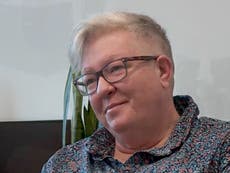‘I speak – but I rarely feel heard’: Why autistic people like me feel lonely
In most spaces I feel like an outsider, and I have always had fewer friends and lasting connections than most

Your support helps us to tell the story
From reproductive rights to climate change to Big Tech, The Independent is on the ground when the story is developing. Whether it's investigating the financials of Elon Musk's pro-Trump PAC or producing our latest documentary, 'The A Word', which shines a light on the American women fighting for reproductive rights, we know how important it is to parse out the facts from the messaging.
At such a critical moment in US history, we need reporters on the ground. Your donation allows us to keep sending journalists to speak to both sides of the story.
The Independent is trusted by Americans across the entire political spectrum. And unlike many other quality news outlets, we choose not to lock Americans out of our reporting and analysis with paywalls. We believe quality journalism should be available to everyone, paid for by those who can afford it.
Your support makes all the difference.Last night, the first part of openly autistic Chris Packham’s much anticipated documentary, Inside Our Autistic Minds, aired on BBC2. The documentary centred autistic voices; shining a spotlight not only on autism but on underrepresented viewpoints within the autistic community, including those of autistic children (pupils at Limpsfield Grange, a school exclusively for autistic girls), an autistic woman (Flo) and a non-speaking autistic person (Murray).
A poignant theme throughout the documentary was loneliness. Towards the start of the documentary, Flo expressed that nobody besides her husband has seen the real her, pupils at Limpsfield Grange alluded to being bullied and having few friends when they studied in mainstream schools, and Murray heartbreakingly explained that he was “alone in [his] world of deep and troubled pining for a person to hear [him]”.
While I could never begin to imagine how lonely it must feel being a non-speaking person in a society that holds speech in such high regard, loneliness is something that I and many other autistic people – speaking and non-speaking – are all too familiar with.
You may be wondering: why?
Every autistic person will have a unique perspective on this, but conversations with many of my fellow autistics over the years indicate that, for many of us, the cause of our loneliness is not being autistic, but society:
- not being aware of our differences;
- not understanding why we may communicate and behave as we do;
- not accepting why we may need to approach life differently;
- not meeting us halfway and accommodating our differences as much as we accommodate theirs.
Personally, I feel privileged to have met some wonderful people over the years and have found great solace in the autistic community. But in most spaces I feel like an outsider, and I have always had fewer friends and lasting connections than most.
Autistic people are a minority in most spaces, and few non-autistic people are keen to connect with me. The general population’s lack of awareness and understanding of autism causes many to be wary of me and/or read ill-intent into my behaviour, even when I am being as kind as I can be.
Few are aware that I am hypersensitive to sound and genuinely can’t grasp what they are saying in locations filled with background noise, such as pubs, clubs, restaurants, busy streets and open plan offices – no matter how loudly and clearly they speak.
Few understand that I truly can’t go for a drink with them after work because I am burnt out, having used all my energy masking my autistic presentations to make them feel comfortable and avoid a confrontation. Few accept that I may communicate more literally, directly and purposefully than they do – and instead misread me as rude, abrupt and angry.
I have spent much of my life feeling lonely. At school, I had few genuine friendships and most of them were more like alliances: the kids on the outside teaming up because there’s strength in numbers and groupwork was unavoidable. At university, I was sneered at for being “serious”, when I was simply fighting to keep my head above water. In many (albeit not all) of my workplaces, I would start off on good terms with my colleagues, then one day find myself ostracised for a reason I could not decipher.
As aware as I am of these challenges, overcoming them to form genuine and lasting connections with others has proven challenging – because reciprocity is vital to all relationships. Much of the time, my efforts do not feel reciprocated.
I am fortunate that I can communicate verbally – and I honour this privilege by using my voice to the best of my ability – but it is rare that I feel truly heard when I speak. I can express a sentiment a million ways, but the gulf between what I say and what others hear is often a mile wide.
Although I try to bridge this gulf by tailoring my communication and explaining myself to the point of overexplaining, few resonate with what I say and are willing to take a leap of faith and trust that what I express is authentic.
All too frequently, what I express is perceived through a neurotypical lens. I see red, most people see blue, and no matter how much effort I put in, I need reciprocity to get to purple. All autistic people do.
We need non-autistic people to abandon preconceptions about autism, take our words at face value, have faith in our perspective, respect our differences (and not take them personally), be receptive to alternative communication methods and (respectfully) ask questions if they are concerned or confused by what we say or do.
Only with the collaboration of non-autistic people can we overcome the debilitating loneliness so many autistic people feel.



Join our commenting forum
Join thought-provoking conversations, follow other Independent readers and see their replies
Comments